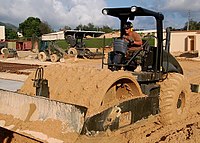
Photo from wikipedia
Tire treads are abraded by friction with the road surface, producing tire tread wear particles (TWPs). TWPs combined with other particles on the road such as road wear particles (RWPs)… Click to show full abstract
Tire treads are abraded by friction with the road surface, producing tire tread wear particles (TWPs). TWPs combined with other particles on the road such as road wear particles (RWPs) and mineral particles (MPs), forming tire-road wear particles (TRWPs). Dust on an asphalt pavement road is composed of various components such as TRWPs, asphalt pavement wear particles (APWPs), MPs, plant-related particles (PRPs), and so on. TRWPs have been considered as one of major contaminants produced by driving and their properties are important for study on real abrasion behaviors of tire treads during driving as well as environmental contamination. Densities of the TRWPs are totally dependent on the amount of the other components deposited in the TWPs. In this study, a classification method of TRWPs in the road dust was developed using density separation and the classified TRWPs were characterized using image analysis and pyrolytic technique. Chloroform was used to remove APWPs from mixture of TRWPs and APWPs. TRWPs were found in the density range of 1.20–1.70 g/cm3. By decreasing the particle size of the road dust, the TRWP content in the road dust increased and its density slightly tended to increase. Aspect ratios of the TRWPs varied and there were many TRWPs with low aspect ratio below 2.0. The aspect ratio range was 1.2–5.2. Rubber compositions of the TRWPs were found to be mainly NR/SBR biblend or NR/BR/SBR triblend.
Journal Title: Polymers
Year Published: 2022
Link to full text (if available)
Share on Social Media: Sign Up to like & get
recommendations!